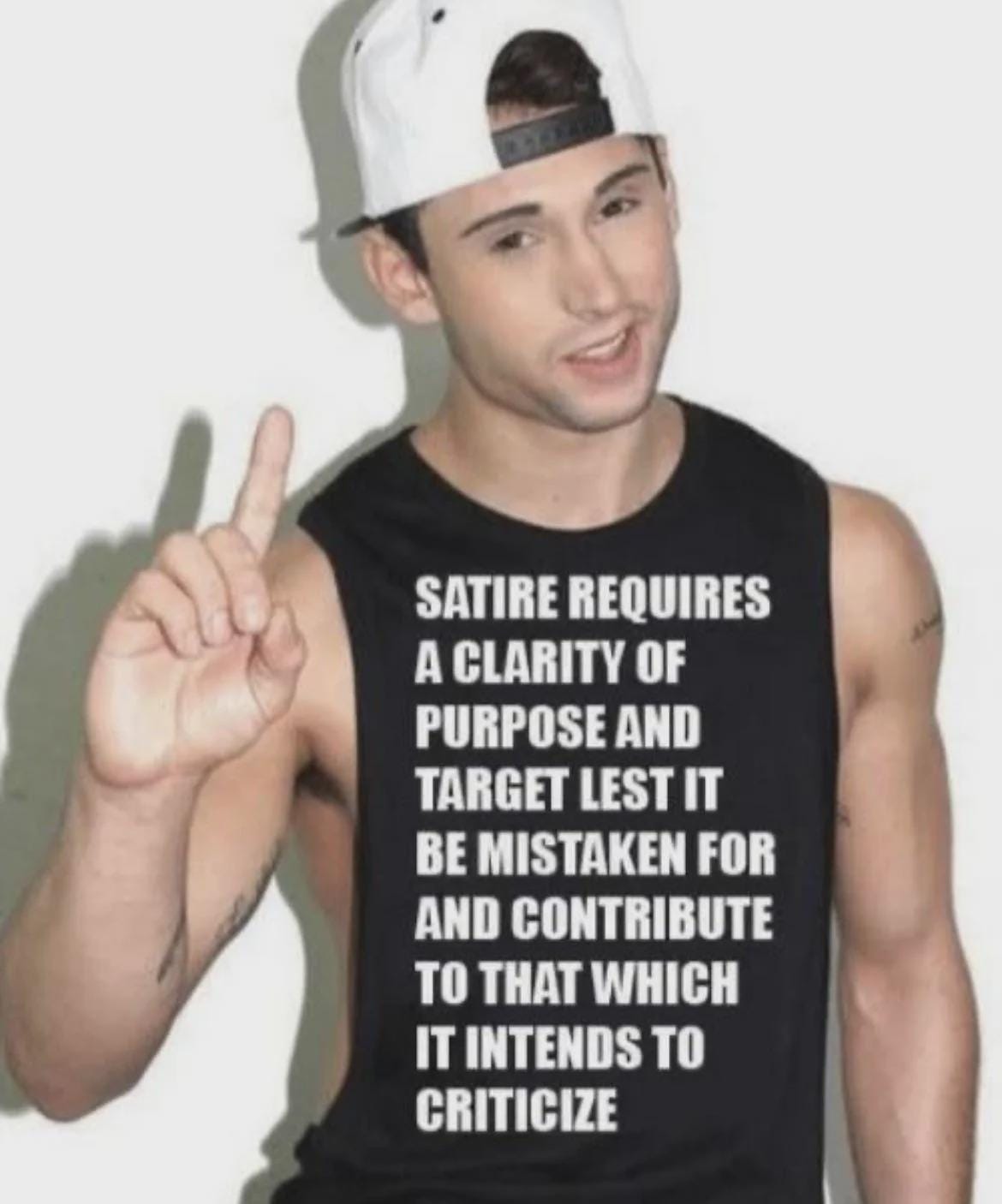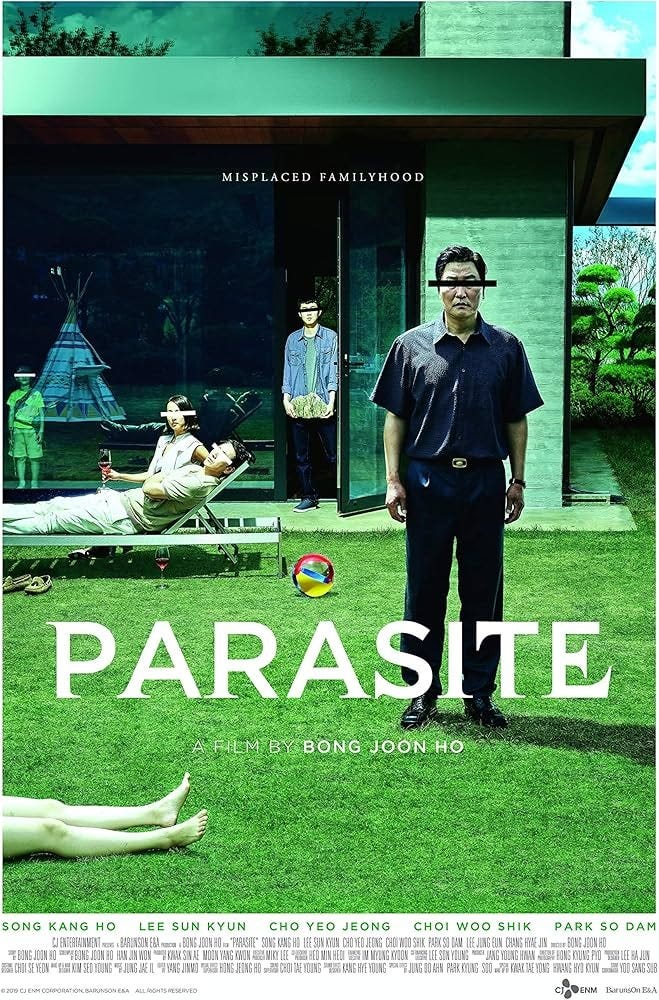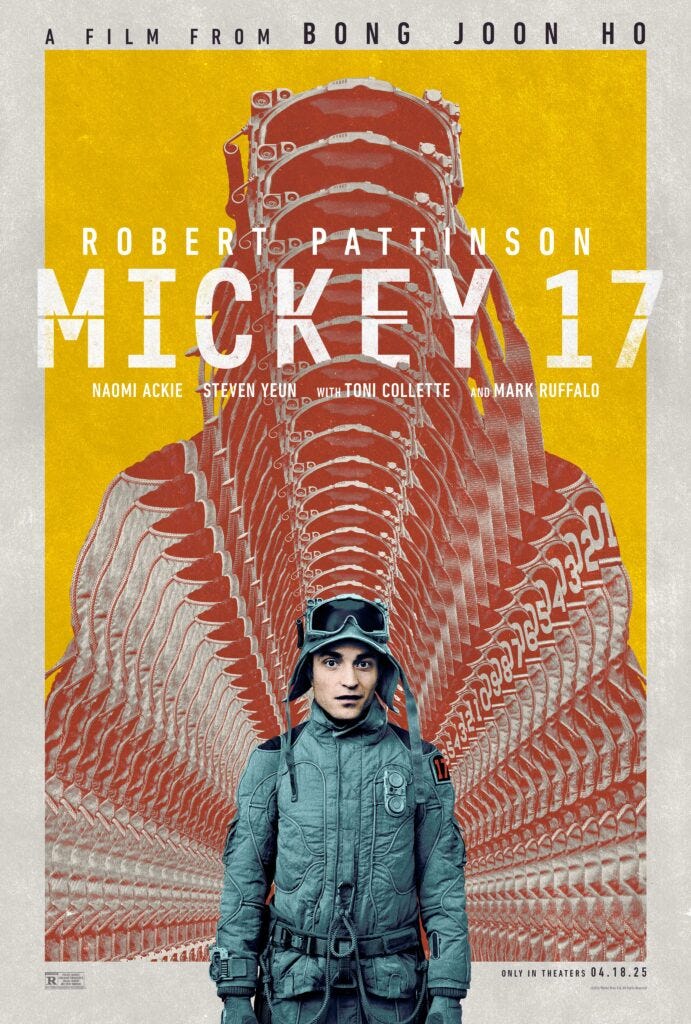Non-Didactic Art Must be Misinterpretable
Why Parasite succeeds where Mickey 17 fails
There’s a meme that goes around about the nature of satire:
The statement itself is fairly agreeable on the face of it. Satire, of course, like any piece of writing, requires clarity and intent to be effective.
Of course, since this is the internet, the meme quickly became a thought-terminating cudgel against any satire the user doesn’t like. Fight Club, a satire of toxic masculinity and societal alienation, has been on the receiving end of this meme more times than I can count. And to be fair, lots of guys famously love Fight Club for the “wrong reasons”. They think Tyler Durden is a gigachad, and that hanging out at the titular fight club is their dream Friday night. And that’s, critics argue, what makes Fight Club a failure as a satire.
But I think that that’s exactly what makes Fight Club an effective satire, and an effective piece of art in general. Fight Club portrays a generation of men disillusioned with the inherent meaninglessness of consumerism and modern life, and gives them a corrosive but intensely appealing alternative in the form of a hypermasculine secret club that promises to give them something to fight for again; it fundamentally wouldn’t work if we didn’t at least understand what makes that club so enticing. Do you know what you call a piece of “art” that promotes a particular idea or point-of-view so bluntly and without room for disagreement that it can’t possibly be misinterpreted any other way? I’ll give you a hint: it starts with a “P”. (No, not porn. Well, actually…)
Speaking of things that start with “P”: Parasite, directed by Bong Joon Ho, won the Best Picture at the 2020 Oscars—the first non-English language film to do so. And while the Oscars definitely don’t always (or even usually) get it right, that year I think they nailed it. I’ve watched the film probably at least four or five times, and it still holds up every time. It’s one of my favorite kinds of movies: an incredibly watchable and accessible crowd-pleaser that manages to effectively communicate interesting and complex ideas, without compromising either accessibility or complexity. And that’s actually very hard to do! The majority of what I’d call “good” films are good on one of those two axises, but so-so at best at the other. Either it’s a fun movie that doesn’t really have that much to say, or it’s an interesting, thought-provoking film that struggles to find mainstream commercial success. Parasite artfully threads that needle and manages to be both.
Besides being the first foreign language Best Picture winner, Parasite was also one of the earliest entries in the then-burgeoning “eat-the-rich” genre. In film we have Knives Out/Glass Onion, The Menu, and Triangle of Sadness; on the small screen we see Succession, The White Lotus, and Sirens. Given the rising levels of income inequality and growing resentment of the ruling class and the elite over the last couple of decades, it’s not a mystery why these films and shows have become so popular. But Parasite still remains the GOAT of the genre, and one thing that makes it stand out from all of its peers is that in Parasite, the poor people are the bad guys.
Okay, not exactly. But it’s a valid reading that’s supported by the text! Libertarian economist Alex Tabarrok of the blog Marginal Revolution wrote this about the film in the post The Gaslighting of Parasite:
Indeed, in the entire film the rich family does nothing wrong whatsoever. This is not my judgement it is what the film tells us. The rich family pay their employees generously (the film goes out of its way to note that they pay overtime), the work is not especially hard (English tutor, art therapist, chauffeur, cook and cleaner), and the employees are treated with respect. Moreover, the rich family are kind and loving. The father works hard but he is not absent. The rich family’s wealth is explicitly shown as coming from innovation and entrepreneurship (not say shady deals or stock market manipulation).
Are the poor family destitute? Not really. The son is handsome, he knows English well and he has an exceptional psychological sense which he uses to teach his student and his father; the daughter is gorgeous and skilled with computers. The mother was a champion athlete, the father is intelligent enough. It’s obvious that this family has everything needed for success. Moreover, the family isn’t discriminated against–they aren’t African-American in the 1950s south, they aren’t Dalits, they aren’t even North Koreans. So why aren’t they successful? One reason is because they aren’t willing to do an honest days work for an honest day’s pay. They fail utterly at folding pizza boxes–not because they are stressed or because the job is difficult–but because they are lazy and don’t give a damn. The film also shows that it is other hard-working, honest-people who are harmed by their laziness (not some evil pizza corporation). The fact that the kids are gorgeous, by the way, is important. The director Bong Joon-ho (and writer Han Jin-won) are telling us to look below the superficial. Note that everything the poor family gets they get by lying and stealing–they are grifters. The son even steals his best friend’s girlfriend–whom he doesn’t even especially like. To exploit her further, he steals her diary.
In fact, Bong Joon-ho hits us over the head with his message. In an early scene, for example, we see the poor family being fumigated but this is not played for pathos. Indeed, the family welcomes the fumigation. The director is telling us that this is the family’s natural habitat. Who gets fumigated? Work it out. The title may help.
This is, objectively, not what Bong Joon Ho intended. Bong has made his own personal politics very explicit, and one of the defining themes of his oeuvre is economic inequality and critique of the capitalist system. From an interview for The Guardian:
But the hard-up Kim family are also hard-working, albeit to more devious ends, and, in contrast to the atomised Park family, they are very unified. “That was one of the things I wanted to talk about with this film,” Bong says. “It’s not as if they have shortcomings or they are lazy. It’s just that they can’t get proper jobs.” He references a conversation in the film about how 500 college graduates applied for a single job as a security guard. “That’s not an exaggeration; it’s based on a real article I read.”
This is in direct contradiction to Tabarrok’s assertion that the Kims “aren’t willing to do an honest days work for an honest day’s pay.” So who’s right? Bong, of course, is the director and mastermind behind the film. But if you are a disciple of the Church of The Dead Author, like I am, you’d know that the creator themselves don’t ultimately get final say: once a work of art is out there, you can’t control what other people take from it. And Tabarrok’s reading is not some bizarre, galaxy-brained one: the double-meaning of the title is pretty clearly meant to be able to refer to either the poor Kims or the rich Parks (or, perhaps, the entire system they inhabit).
Now, I don’t agree with Tabrrok’s reading entirely, though I do think many left-wing readings of the film go too far in absolving the Kims, vilifying the Parks, and overall flattening the message. For me, the central thesis of it is best expressed in the exchange between Mr. and Mrs. Kim the night the Kims sneak into the Parks’ home: “They are rich but still nice,” Ki-taek says. “They are nice because they are rich,” Chung-sook replies.
But I think Parasite is open to such a wide variety of interpretations because it accurately portrays reality. And people in our reality, in our existing socioeconomic systems, come to wildly different conclusions about how good things are and what problems we have and who’s to blame. The film certainly has a point-of-view, and Bong’s personal leanings are certainly present—whatever you think about the Kims or Parks, the ending pretty clearly conveys the message that there’s nothing the Kims could have or could ever do to reach where the Parks are—but (ironically, considering what happens in the movie) it doesn’t beat you over the head with it.
Mickey 17 is Bong’s follow-up to Parasite, and his third English-language film. Given how much of a Parasite fan I was, I was cautiously excited for this one; Bong’s English movies have generally been weaker than his Korean ones, IMO, but the sample size was small given that he’d only made two of the latter. Unfortunately, when I finally saw it, I found Mickey 17 to be a pretty massive disappointment. Robert Pattinson does his best to carry the film, but he doesn’t quite manage to take it over the finish line. The humor doesn’t land; the dialogue is often stilted and awkward; Ruffalo’s Trump feels like an SNL bit; the story is bloated (there’s a quick scene that explains why “multiples”, i.e. clones, are banned, and it feels like a total non-sequitur that feels like it should have been left on the cutting room floor).
I know I’m in the minority on this one; while Mickey 17 hasn’t been received to nearly the same level of universal praise of Parasite has, it’s currently sitting at a 77% on Rotten Tomatoes, a 6.8 on IMDB, and a 3.6/5 on Letterboxd. Not stellar, but overall people seem to be positive on it. But while a lot of my dislike for the movie comes down to matters of subjective taste (e.g. the comedy), on a slightly more objective level I can say that Mickey 17 is unambiguously more didactic than Parasite.
Now, didactic is not a synonym for bad; sometimes, a movie can pursue a lack of subtlety to great success. Boots Riley’s messy-but-full-of-life directorial debut Sorry to Bother You is another leftist anti-capitalist polemic of a movie, and it doesn’t mince words—it’s a film in which a CEO plans on turning its workers into literal workhorses through genetic modification. But what makes STBY work is that it portrays the complexity of people’s reactions to the capitalist system. The protagonist, Cassius Green (whose name is another great example of the film’s complete lack of subtlety), just wants to make a living and get by. His girlfriend, Detroit, is an artist who secretly participates in a covert anti-capitalist activist group. His coworker Squeeze fights within the system, pushing for unionization. And his fellow white-voicer Mr. Blank has already completely sold out—his soul, his voice, even his name. The movie clearly picks a side, but it paints its side with a wide range of colors.
By contrast, Mickey 17 is a movie in black-and-white: there’s good guys and bad guys, and that’s it. Mickey and Nasha are the good guys, who recognize the creepers’ right to self-determination and overthrow the greedy overlords of their expedition. Kenneth and Ylfa Marshall are the greedy overlords of their expedition: they’re shortsighted, selfish, and worst of all, annoying. There’s other named characters in the movie too, but they’re pretty much the only ones who matter or have any extensive characterization. Timo (played by a criminally underutilized Steven Yeun) is the main exception, but his arc never really goes anywhere, and it feels like he could’ve been excised out of the film entirely without it losing much of importance.
Maybe “propaganda” is too strong of a word, but STBY is definitely not a movie that’s trying particularly hard to convince anyone who isn’t already strongly receptive to its message, if not already fully on board. It’s not an argument, but a rallying cry, a manifesto urging leftists to unionize, coalition-build, and fight the power.
Parasite, on the other hand, while maybe not intentionally trying to court the other side, has probably been much more effective at doing so. This is anecdotal evidence (i.e. not evidence), but my fairly moderate mom said she came out of this movie a lot more sympathetic towards the plight of the lower class. And it’s because Parasite is art that reflects reality, and specifically, the reality of human behavior. In STBY, Steve Lift, the antagonistic CEO played by the late, great Armie Hammer, is not a real human being; he’s an evil spirit that puts a face on the intangible beast that is unfettered capitalism. And that’s a perfectly valid way to approach character-writing sometimes—for a less political example, Anton Chigurh of No Country for Old Men is less a man than a sheer force of nature, and he’s maybe one of the greatest antagonists to ever grace the silver screen.
By contrast, however, everyone in Parasite is a real human being. The rich, naive Parks may be comically exaggerated in their sheer gullibility and myopia, but they’re fundamentally recognizable archetypes of people. So, too, are the Parks, and Gook Moon-gwang and Oh Geun-sae (the housekeeper and her basement-bound husband). Parasite is a microcosm of class struggle in South Korea and, unintentionally, much of the rest of the world as well, which is what catapulted it to such global recognition and acclaim. And because Parasite paints both the Kims and Parks with the real, flawed, messy brush of reality, both liberals, conservatives, and everyone in between can see what they want to see when they watch the film.
Again, non-didacticism and subtlety are not inherently better than the alternative. But I think it does indicate a level of confidence in one’s work and one’s own beliefs. Because to create a piece of art that accurately reflects reality without distorting it in favor of your perspective is to claim that reality itself supports your perspective; that the best argument for what you believe is simply to see the world as it is. “Reality has a liberal bias”, Stephen Colbert once famously said. Parasite puts that to the ultimate test.





![Amazon.com: Sorry to Bother You (DVD) [2018] : סרטים וטלוויזיה Amazon.com: Sorry to Bother You (DVD) [2018] : סרטים וטלוויזיה](https://substackcdn.com/image/fetch/$s_!JOIt!,w_1456,c_limit,f_auto,q_auto:good,fl_progressive:steep/https%3A%2F%2Fsubstack-post-media.s3.amazonaws.com%2Fpublic%2Fimages%2F6c032916-1f73-4abb-bff3-cbd7a39183c0_705x1000.jpeg)
I got to this essay late because I found it from here: https://x.com/funplings/status/1959587083992842630
I'm a bit surprised that when you talked about STBY that you said "unfettered capitalism" when "unbridled capitalism" is right there. 😛 Sorry, just horsing around. (IYKYK. 😁)
The view that satire equals morality tale has always rubbed me the wrong way. Kurt Vonnegut has always been the model of a satirist in my mind.
Harrison Bergeron is so often read as hyper-individualist or even objectivist, but I think if anything the key satire is when the 7 foot tall Harrison fanticifully starts flying, just before being shot down!
Breakfast of Champions brings up this issue of clarity versus subtlety directly... I should finish that one.